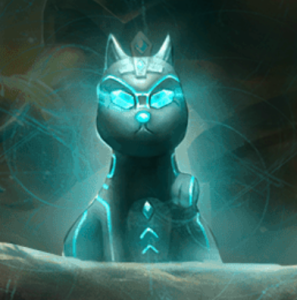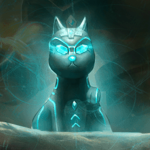Fuel Games, makers of the Gods Unchained Ethereum-based card game, announced on Thursday that the game will incorporate one of the truly unique applications of blockchain tech in gaming: interoperability. In broad outlines, it means the ability to use players’ unique, blockchain-backed items—in Ethereum’s case, usually ERC-721 tokens—across multiple games. For the next two weeks, any player who owns a CryptoKitty blockchain collectible will be able to buy a limited edition cat-themed card pack for 0.024 ETH. It will include a standard rare pack and a “unique and tradable talisman” that will display in-game. CryptoKitties will also be selling a series of Gods Unchained-inspired Kitties.
 This is not the first experiment of its kind. “KittyRace” is a third-party game that lets players pit their CryptoKitties against each other on a (minimal) racetrack. A cluster of games including Cats in Mechs tout themselves as part of a “multiverse” of interoperable game assets. Because ERC-721 tokens are tracked on a public blockchain, game-makers don’t need permission to integrate another game’s player items.
This is not the first experiment of its kind. “KittyRace” is a third-party game that lets players pit their CryptoKitties against each other on a (minimal) racetrack. A cluster of games including Cats in Mechs tout themselves as part of a “multiverse” of interoperable game assets. Because ERC-721 tokens are tracked on a public blockchain, game-makers don’t need permission to integrate another game’s player items.
The Gods Unchained interoperability appears to be exclusively cosmetic—yesterday’s announcement doesn’t detail any gameplay effects for the CryptoKitties talisman. That’s in contrast with Mythereum, another blockchain-based card game that actually lets players turn their CryptoKitties into playable cards, with statistics determined by the kitty’s digital “DNA”. More than a few commentators have argued that the feature could make blockchain part of the future of gaming, and Sony has even approved a blockchain-linked game, Plague Hunters, for the Playstation 4.
But Gods Unchained may be the most high-profile project to introduce some kind of interoperability: The game is beginning to look like a breakout blockchain application, with excellent production values and positive early gameplay reviews. Coinbase named Gods Unchained its “Title to Watch” for 2019. A reported 400,000 Gods Unchained packs had been purchased as of early December, at a price between 0.012 ETH (about US$1.50 today) for a “Rare” pack, all the way to 1 ETH (About US$128) for a “Shiny Legendary” pack. And that was before most players could even try out the game.
Gods Unchained is also, compared to many blockchain applications, notably easy to use. Players will apparently be able to use 250 cards from the ‘standard’ set without buying anything at all, which should amount to a frictionless on-ramp for players who have never engaged with a blockchain application. Once they decide to buy packs, all that’s required is a web browser equipped with the Metamask extension, and a small stash of ETH. (Disclosure: I know this because I’ve bought several packs. I suppose that means I now have a tiny financial interest in the game’s success—though I haven’t pulled any really rare cards. Dammit).
Gods Unchained has been in closed beta test since late November. Though not without unique twists, it takes heavy inspiration from Activision Blizzard’s Hearthstone, a collectible card game based on the World of Warcraft series. Like Hearthstone, players in Gods Unchained use cards to do battle by summoning creatures or casting spells, a format that stretches back at least a quarter-century to Magic: The Gathering. But the parallels go further: Gods Unchained creatures have statistics and specific mechanics that will be familiar to Hearthstone players, though under different names (“Battlecry” becomes “Roar,” “Charge” becomes “Blitz,” etc.)
That might be disappointing to some (Mythereum proudly points out it’s “not just another Hearthstone clone”). But the substantial familiarity of the game-play will hopefully help overcome prospective player’s anxiety about engaging with the blockchain, boosting both the game’s audience and, eventually, usage of Ethereum. Using a tried-and-tested format could also help the developers avoid the game’s most obvious pitfall: in many collectible card games, cards and effects have to be periodically “rebalanced,” or have their statistics and effects changed when they appear over- or under-powered. That will apparently not be possible in Gods Unchained because of the immutable nature of the card tokens. Though that’s a selling point for many players, it does mean a handful of unbalanced cards, impossible to remove or alter, could wind up being worth an awful lot of money. Magic: The Gathering’s most infamously rare and unbalanced card, The Black Lotus, has reached prices as high as $87,000.
Now just imagine if you could use it in Grand Theft Auto.
